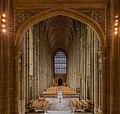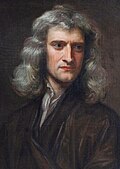Portal:England
The England portal

| |
England is a country that is part of the United Kingdom. It is located on the island of Great Britain, of which it covers about 62%, and more than 100 smaller adjacent islands. It shares a land border with Scotland to the north and another land border with Wales to the west, and is otherwise surrounded by the North Sea to the east, the English Channel to the south, the Celtic Sea to the south-west, and the Irish Sea to the west. Continental Europe lies to the south-east, and Ireland to the west. At the 2021 census, the population was 56,490,048. London is both the largest city and the capital.
The area now called England was first inhabited by modern humans during the Upper Paleolithic. It takes its name from the Angles, a Germanic tribe who settled during the 5th and 6th centuries. England became a unified state in the 10th century and has had extensive cultural and legal impact on the wider world since the Age of Discovery, which began during the 15th century. The Kingdom of England, which included Wales after 1535, ceased to be a separate sovereign state on 1 May 1707, when the Acts of Union brought into effect a political union with the Kingdom of Scotland that created the Kingdom of Great Britain.
England is the origin of the English language, the English legal system (which served as the basis for the common law systems of many other countries), association football, and the Anglican branch of Christianity; its parliamentary system of government has been widely adopted by other nations. The Industrial Revolution began in 18th-century England, transforming its society into the world's first industrialised nation. England is home to the two oldest universities in the English-speaking world: the University of Oxford, founded in 1096, and the University of Cambridge, founded in 1209. Both universities are ranked amongst the most prestigious in the world.
England's terrain chiefly consists of low hills and plains, especially in the centre and south. Upland and mountainous terrain is mostly found in the north and west, including Dartmoor, the Lake District, the Pennines, and the Shropshire Hills. The London metropolitan area has a population of 14.2 million as of 2021, representing the United Kingdom's largest metropolitan area. England's population of 56.3 million comprises 84% of the population of the United Kingdom, largely concentrated around London, the South East, and conurbations in the Midlands, the North West, the North East, and Yorkshire, which each developed as major industrial regions during the 19th century. (Full article...)

Albert Bridge is a road bridge over the River Thames connecting Chelsea in Central London on the north bank to Battersea on the south. Designed and built by Rowland Mason Ordish in 1873 as an Ordish–Lefeuvre system modified cable-stayed bridge, it proved to be structurally unsound, so between 1884 and 1887 Sir Joseph Bazalgette incorporated some of the design elements of a suspension bridge. In 1973 the Greater London Council (GLC) added two concrete piers, which transformed the central span into a simple beam bridge. As a result, today the bridge is an unusual hybrid of three different design styles. It is an English Heritage Grade II* listed building.
Built as a toll bridge, it was commercially unsuccessful. Six years after its opening it was taken into public ownership and the tolls were lifted. The tollbooths remained in place and are the only surviving examples of bridge tollbooths in London. Nicknamed "The Trembling Lady" because of its tendency to vibrate when large numbers of people walked over it, the bridge has signs at its entrances that warn troops to break step whilst crossing the bridge. (Full article...)
Selected article -

The Protectorate, officially the Commonwealth of England, Scotland and Ireland, was the English form of government lasting from 16 December 1653 to 25 May 1659, under which the kingdoms of England, Scotland, and Ireland, with their associated territories were joined together in the Commonwealth of England, governed by a Lord Protector. It began when Barebone's Parliament was dissolved, and the Instrument of Government appointed Oliver Cromwell as Lord Protector of the Commonwealth. Cromwell died in September 1658 and was succeeded by his son Richard Cromwell.
Richard resigned in May 1659 due to his inability to control either the Army or Parliament. He was replaced by the English Committee of Safety, which dissolved the Third Protectorate Parliament, and reseated the Rump Parliament dismissed by his father in April 1653. This marked the end of the Protectorate, with the Rump acting as the legislature and the English Council of State as the executive. (Full article...)
General images
The Experienced English Housekeeper is a cookery book by the English businesswoman Elizabeth Raffald (1733–1781). It was first published in 1769, and went through 13 authorised editions and at least 23 pirated ones.
The book contains some 900 recipes for: soups; main dishes including roast and boiled meats, boiled puddings, and fish; desserts, table decorations and "little savory dishes"; potted meats, drinks, wines, pickles, preserves and distilled essences. The recipes consist largely of direct instructions to the cook, and do not contain lists of ingredients. The book is illustrated with three fold-out copper plate engravings. (Full article...)
Did you know?

- ...that the Mendip Hills (commonly called The Mendips) are a range of limestone hills situated to the south of Bristol and Bath in Somerset?
- ...the England and Wales Cricket Board was created on 1 January 1997 combining the roles of the Test and County Cricket Board (TCCB), the National Cricket Association (NCA) and the Cricket Council?
- ...that the Flag of England is the St George's Cross?
- ...that the Tudor rose (pictured) is a traditional heraldic emblem of England and takes its name and origins from the Tudor dynasty?
In the news

- 20 June 2025 –
- The United Kingdom parliament votes to approve a bill allowing terminally ill adults to voluntarily end their lives, moving towards legalizing assisted suicide in England and Wales. (DW) (BBC News)
- 10 June 2025 – Fossil fuel phase-out
- The British government announces it will invest £14.2 billion (US$19 billion) to construct the new Sizewell C nuclear power station in Suffolk, England, to reduce the country's reliance on fossil fuels. (AP) (Reuters)
Selected featured content
Categories
Selected quotes
| “ | The rustics of England, especially those inhabiting the South hams (villages) of Devonshire, have great fun Wassailing the Orchards on Christmans Eve, New Year's and Twelfth Nigh (Boxing Day), when they drink toasts to the largest apple trees and sprinkle them with cyder (cider) carried by the beadle, the parish clerk, or some other such obsolete individual. The Devonshire people do this because they did it the year before. | ” |
Related WikiProjects
England • Bedfordshire • Brighton • Cheshire • Cornwall • Derbyshire • Dorset • Greater Manchester • Hampshire • Lincolnshire • London • Merseyside • Northamptonshire • North East England • Sheffield • Surrey. Warwickshire • West Midlands • Worcestershire • Yorkshire
Topics
Things you can do

- Please visit the English Wikipedians' notice board and help to write new England-related articles, and expand and improve existing ones.
- Visit Wikipedia:WikiProject England/Assessment, and help out by assessing unrated English articles.
- Add the Project Banner to English articles around Wikipedia.
- Check for announcements and open tasks for ways to improve English related articles.
- Help nominate and select new content for the England portal.
- Requested articles: Charterhouse Lane • Renewable energy in England • Ealing Village
- Expand: Dorothy Boyd • David Troughton
Related Portals
 |
 |
 |
 |
 |
 |
 |
 |
| East Midlands | London | North East | North West | South East | South West | West Midlands | Yorkshire and the Humber |

|

|

|

|

|
| Ireland | Northern Ireland | Scotland | United Kingdom | Wales |
Associated Wikimedia
The following Wikimedia Foundation sister projects provide more on this subject:
-
Commons
Free media repository -
Wikibooks
Free textbooks and manuals -
Wikidata
Free knowledge base -
Wikinews
Free-content news -
Wikiquote
Collection of quotations -
Wikisource
Free-content library -
Wikiversity
Free learning tools -
Wikivoyage
Free travel guide -
Wiktionary
Dictionary and thesaurus






















































![Image 53The Staffordshire Hoard is the largest hoard of Anglo-Saxon gold and silver metalwork yet found[update]. It consists of almost 4,600 items and metal fragments. (from Culture of England)](/media/wikipedia/commons/thumb/6/60/Staffordshire_hoard_annotated.jpg/120px-Staffordshire_hoard_annotated.jpg)















































